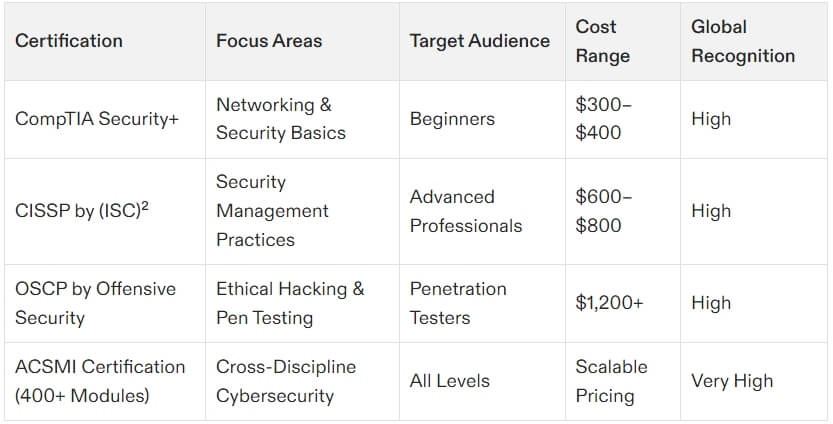Table of Contents
When it comes to protecting the digital world, cybersecurity professionals are the gatekeepers standing between organizations and potential cyber threats. However, in a rapidly evolving landscape, how do you gain the skills and credibility to meet these challenges head-on? Enter the cybersecurity certification best programs—your gateway to expertise, higher salaries, and job security.
The right certifications are more than just credentials on paper; they are symbols of knowledge, a commitment to excellence, and essential for career growth. But with so many certifications available, it’s crucial to identify the ones that provide the most value for your career path.
Why Pursue Cybersecurity Certifications?
Before identifying the cybersecurity certification best option for your goals, it’s important to understand why credentials hold such significance in the cybersecurity space.
Certifications validate your expertise, proving you possess the skills to secure networks, data, and systems against malicious activities. They are trusted by employers globally, ensuring job-readiness and credibility.
Key Reasons to Obtain Cybersecurity Certifications
-
Global Industry Recognition
Top-tier certifications like CISSP, CompTIA Security+, and ACSMI’s specialized modules are widely recognized, immediately enhancing your resume. -
Demonstrated Expertise
Certifications offer built-in proof that you’re qualified to combat threats like malware, phishing, ransomware, and DDoS attacks. -
Path to Better Salaries
Certified professionals command salaries up to 20% higher than their uncertified counterparts due to demonstrated capabilities. -
Alignment With Emerging Needs
Programs like ACSMI’s 400+ modules ensure learners stay up-to-date with evolving threats and cutting-edge practices.
Start with ACSMI’s advanced cybersecurity certification modules today!
Cybersecurity Certification Best Options
Finding the “best” certification depends on your current skill level, intended career path, and market demands. Below is a breakdown of the top certifications to consider.
1. Certified Information Systems Security Professional (CISSP)
Offered By: (ISC)²
CISSP is widely regarded as one of the most prestigious certifications for experienced cybersecurity professionals. Covering domains like risk management, asset security, and security architecture, it’s ideal for leadership roles.
Who It’s For:
- Security managers
- IT directors
2. CompTIA Security+
Offered By: CompTIA
Recognized globally as a beginner-friendly credential, Security+ focuses on foundational skills such as network security, ethics, and security controls.
Who It’s For:
- Entry-level professionals
- Aspiring SOC analysts
3. Offensive Security Certified Professional (OSCP)
Offered By: Offensive Security
Known for its hands-on approach, OSCP focuses on penetration testing, making it perfect for those pursuing an ethical hacking career.
Who It’s For:
- Penetration testers
- Red team roles
4. ACSMI Cybersecurity Certification
Offered By: ACSMI
With 400+ modules, ACSMI certification provides an unmatched, in-depth and flexible training experience. It’s ideal for both beginners and experienced pros aiming to master a wide array of cybersecurity domains.
Who It’s For:
- All experience levels
- Career pivoters or knowledge enhancers
Learn more about ACSMI’s flexible and comprehensive certification modules here.
Benefits of the Cybersecurity Certification Best Programs
Achieving the cybersecurity certification best suited for your goals comes with rewards that can impact your career and financial future.
1. Career Opportunities
Certifications can unlock prestigious roles like Security Manager, Ethical Hacker, or SOC Analyst. Employers often list certifications as prerequisites for these positions.
2. Expanded Earning Potential
According to research, professionally certified cybersecurity specialists often earn higher salaries. For example, someone with CISSP can earn an average of $120,000 annually.
3. Confidence in Practical Knowledge
Given the focus on real-world challenges in certifications like OSCP or ACSMI, candidates are better equipped to solve “live” cybersecurity issues in their roles.
4. Networking Through Certification Bodies
Most certification bodies encourage member networking, helping professionals connect with mentors or opportunities. Certifications from (ISC)² or ISACA often come with access to exclusive networks.
How to Choose the Cybersecurity Certification Best Suited for You
Below are key factors to consider when selecting the right cybersecurity certification.
1. Career Goals
Are you an aspiring penetration tester, a cloud security specialist, or a security auditor? Choose certifications that align closely with your future job role.
2. Learning Style
Programs like ACSMI’s 400+ modules offer flexible, online options, while certifications like OSCP require intensive hands-on work.
3. Global Recognition
Certifications like CISSP or CompTIA Security+ are widely recognized, ensuring your skills translate across job markets.
4. Budget and Time Frame
Set realistic expectations for investment in terms of cost and time. Beginner certifications like Security+ are affordable, while advanced ones like ACSMI’s modules offer premium features at scalable prices.
5. Continuous Growth
Certifications like those from ACSMI provide progressive learning paths, allowing you to gain beginner knowledge and grow into mastery.
FAQs
1. Which is the cybersecurity certification best for beginners?
CompTIA Security+ and ACSMI beginner modules are widely recommended as they provide foundational knowledge.
2. How long does it take to complete a certification?
On average, certifications require 2–6 months of study, depending on the complexity and prior experience.
3. Can I specialize further after earning a beginner certification?
Yes, certifications like CISSP or ACSMI’s flexible modules enable continuous specialization and upskill opportunities.
4. Are certifications worth their investment?
Absolutely. Certifications provide credibility, align your skills with market needs, and often lead to higher salaries.
5. How does ACSMI compare to other certification providers?
ACSMI stands out with its 400+ modules, offering unmatched depth of training, flexibility, and applicability across diverse cybersecurity roles.
6. Are all certifications globally recognized?
Reputable certification bodies like (ISC)², CompTIA, and ACSMI ensure their credentials carry global validity.
7. Do certifications require maintenance or renewal?
Yes, most certifications require continuing education credits or renewal every 2–3 years to stay valid.
8. Is hands-on practice included in certifications?
Certifications like OSCP and ACSMI focus significantly on hands-on, real-world problem-solving skills.
Comparison of Cybersecurity Certifications
Final Thoughts
The cybersecurity certification best pathways provide both newcomers and advanced professionals with the tools to excel in an industry full of growth opportunities. Whether you’re validating your beginner skills or advancing to specialized fields, certifications are indispensable.
Among the available options, ACSMI’s certifications stand out for their unmatched adaptability, comprehensive modules, and focus on practical applications. By choosing certifications like these, you’re not just earning a credential; you’re building a career ready for the demands of cybersecurity in 2025 and beyond.
Start building your skills with ACSMI’s 400+ cybersecurity modules today!


Leave a Reply